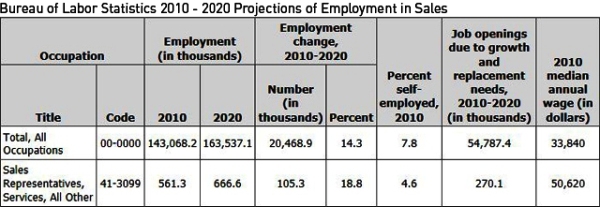 Lead generation and revenue growth are the lifeblood of every business, ensuring the continued success and stability of the organization. As a result, salespeople play a key role in helping companies remain viable and competitive in the marketplace. With a growing number of employers gaining confidence in the rebounding economy and deciding to expand their businesses, the ability to hire top sales talent is becoming increasingly important, yet challenging in today’s job market. In this new climate where quality salespeople are hard to find, where are top salespeople located? Why are they difficult to recruit and how can employers attract these candidates to their organizations?
Lead generation and revenue growth are the lifeblood of every business, ensuring the continued success and stability of the organization. As a result, salespeople play a key role in helping companies remain viable and competitive in the marketplace. With a growing number of employers gaining confidence in the rebounding economy and deciding to expand their businesses, the ability to hire top sales talent is becoming increasingly important, yet challenging in today’s job market. In this new climate where quality salespeople are hard to find, where are top salespeople located? Why are they difficult to recruit and how can employers attract these candidates to their organizations?
Salespeople are vital to our economic recovery since their roles have a direct path to revenue growth and profitability within companies. In spite of increased demand for sales roles, our economy is suffering, in part, because of the shortage of qualified salespeople. These unfilled sales positions limit the ability of many companies to achieve their revenue potential; companies with stronger sales teams can end up winning the business.
According to the U.S. Bureau of Labor Statistics, sales jobs are projected to grow 18.8 percent between 2010-2020, compared to 14.3 percent for the total of all other occupations. However, what’s worrisome is that the number of sales candidates between age 25 to 40 entering the workforce will grow at less than 1 percent. The shortage only threatens to grow as baby boomers leave mid- and senior-level sales positions. The U.S. Department of Labor estimates that companies will lose 40 percent of their senior talent by 2016, placing a significant strain on Gen X talent, which is already insufficient to replace departing boomers. So with the growing number of open sales positions, why is it tougher than ever to recruit great salespeople?
PREMIUM CONTENT: Sales Force Compensation Survey: Executive Summary
During the recession, as business demand and profitability fell, salespeople were frequently the first employees to be laid off. According to USA Today, close to 1.6 million left the field and many changed occupations or moved to other regions. As a result, the talent pool among salespeople has become extremely small.
The role of a salesperson also changed during the recession. More technical and industry-specific knowledge is now demanded, requiring salespeople to not only sell but also explain products and services in extreme detail — something that was previously the responsibility of business development specialists. Salespeople are required to do more, yet are not being compensated as such.
Although more is required of salespeople, few colleges and business schools offer educational classes, in part because of the field’s tarnished image, according to ES Research, which provides data on sales training firms.
The market is also candidate-driven among experienced or top senior-level candidates. The best candidates are typically happily employed and are reluctant to move to other companies unless the prospective employer is able to present a significantly better opportunity.
With candidates becoming more selective about their next opportunity and companies tightening their belts on sales compensation, finding the right sales talent can be a daunting challenge. Leaving one position for another is a gamble for salespeople. Recruiters have to know the prospective employer and the job opportunity well in order to sell the position.
The sales environment has changed and we as recruiters and hiring managers have to take this into consideration when recruiting salespeople in today’s job market. As we become more knowledgeable about why sales positions remain unfilled, we can work more cohesively to build strategies that attract top candidates. Employers can review and adjust hiring practices, salary and benefits packages to be more enticing to star talent, while recruiters can reinforce their value by connecting clients with the ‘A’ players in their respective markets, with whom they have long-standing relationships.










[…] MORE: Where have all the salespeople gone? […]